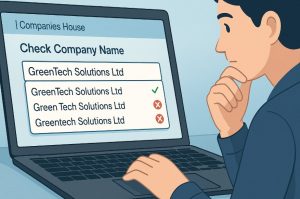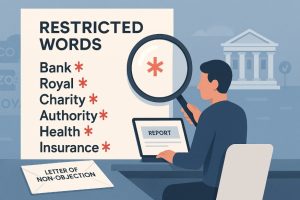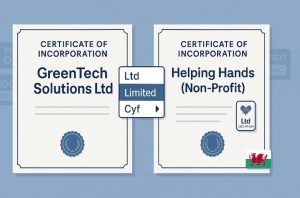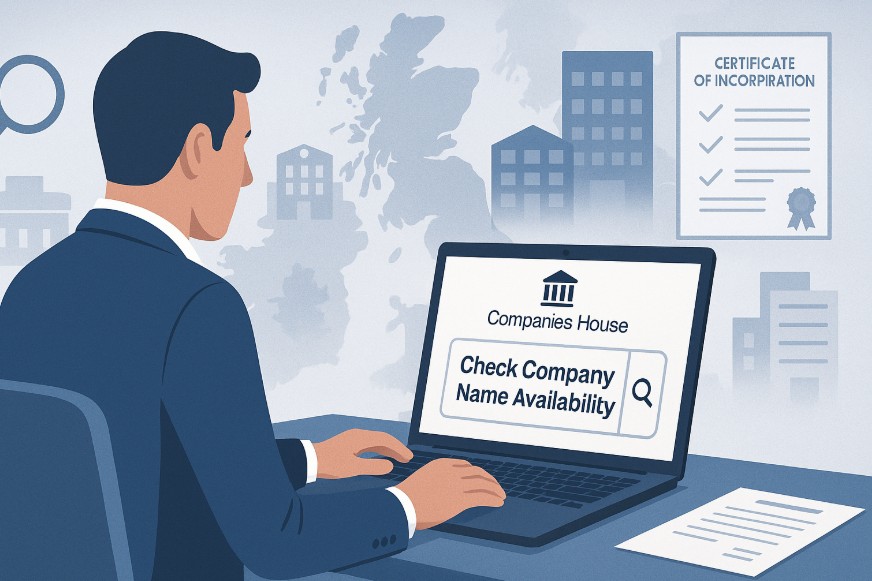Did you know there are over 4.5 million registered companies in the United Kingdom? With so many names already claimed, selecting a unique and legally compliant business name is an essential step in establishing your company.
Whether you’re launching a new startup or rebranding an existing business, one of the first actions you should take is to check name availability on Companies House.
This comprehensive guide will walk you through how to search for company name availability using official UK government tools, what the legal naming rules are, and how to protect and finalise your chosen name. We’ll also explore common mistakes and provide tips to help you make the right choice from the beginning.
Why Is It Important to Check Company Name Availability?

A business name is more than just a label, it represents your company’s identity, vision, and market positioning. It’s often the first thing potential customers notice, and it sets the tone for how your brand is perceived.
Ensuring that your chosen name is both unique and compliant with UK regulations avoids legal complications and helps build a solid foundation for brand recognition.
Failing to check name availability may result in your application being rejected, or worse, you may find yourself in a legal dispute with an existing company over trademark or intellectual property infringement. This could force you to rebrand after already investing in marketing and design—an expensive and time-consuming process.
What Is Companies House?
Companies House is the official registrar of companies in the UK. It operates under the Department for Business and Trade and holds records for over 4.5 million registered companies. It manages all company registrations, updates, and dissolutions across England, Wales, Scotland, and Northern Ireland.
The registrar provides a variety of services to the public and business owners, one of which is a searchable register of company names. This register is updated in real time and is the authoritative source to determine whether a company name is already in use or too similar to another name.
What Does Companies House Do for Business Name Registration?

Companies House offers several tools and services to ensure that businesses choose and register names that are both unique and legally acceptable. Its online name availability checker connects directly to its live index of companies, making it the most accurate resource available.
It also provides rules and guidance to help applicants understand what makes a company name acceptable, ensuring that the public is not misled by businesses using inappropriate or misleading names.
How Can You Search for Company Name Availability?
To begin your name search, go to the Companies House name availability checker available through the UK Government’s official website. Enter your desired name into the search bar. The tool immediately returns results showing whether the name is available, too similar to another, or already taken.
If your search returns a message stating “Congratulations! This name is available,” it means you can proceed to register the name. If the tool states “Sorry, this company name is unavailable,” you will need to modify your name until you find one that meets the criteria.
Before conducting your search, it’s advisable to familiarise yourself with the key naming rules imposed by Companies House. Doing so will increase the likelihood of your application being accepted without delays.
What Tools Can You Use to Check a Company Name?

When starting a business in the UK, verifying the availability of your company name is one of the first formal steps you’ll take. Fortunately, several tools are available to help you carry out this task quickly and accurately. These tools are primarily provided by Companies House, the UK’s official registrar, but there are also reliable third-party options that offer additional features.
1. Companies House Name Availability Checker
This is the most direct and authoritative tool for checking whether a name is already registered. Hosted on the UK Government website, the Companies House name availability checker connects directly to the official index of registered companies.
You simply enter your preferred name into the search bar. The tool provides real-time feedback, showing whether the name is:
- Available for registration
- Already in use by another company
- Too similar to an existing name
This tool is especially useful because it reflects the most current data, helping to avoid application delays caused by overlooked conflicts.
2. Companies House WebCHeck
WebCHeck is an older platform still maintained by Companies House. It allows you to search the public register for existing companies, view company filings, and confirm whether a name or a variation of it already exists. While the interface is less modern, it remains useful for cross-referencing active and dissolved businesses.
WebCHeck provides:
- A historical view of existing company names
- Status updates on businesses (active, dissolved, in liquidation)
- Access to official filing documents
3. Companies House Service (CHS)
The Companies House Service (CHS) is the newer, more integrated platform that combines several tools and services into one dashboard. It allows users to:
- Search for company names
- File annual returns and confirmation statements
- View directors’ details
- Track company changes
It provides a more user-friendly and responsive experience compared to WebCHeck, making it ideal for both prospective business owners and professionals who regularly interact with Companies House.
4. Third-Party Name Checkers
Beyond official government resources, several third-party platforms offer enhanced search capabilities that include:
- Company name availability (linked to Companies House data)
- Domain name availability
- Social media handle checks
- Trademark availability insights
Some of the most trusted third-party tools include:
- 1st Formations
- Rapid Formations
- The Formations Company
These platforms are especially useful if you’re looking to handle name registration, domain acquisition, and even business incorporation all in one place.
How Can You Check a Business Name Using Companies House?
Checking if your business name is available is a straightforward but critical task in the company formation process. The UK Government provides a user-friendly system to ensure you can quickly determine whether your desired name is already registered or potentially too similar to another. Here’s how to perform a proper name check using Companies House:
Step 1: Visit the Official Companies House Website

Start by navigating to the official UK Government site for Companies House. You can access the name availability tool directly at: (https://find-and-update.company-information.service.gov.uk/company-name-availability). This tool is linked directly to the Companies House database and is updated in real time.
Step 2: Enter Your Proposed Company Name

Once on the name checker page, simply enter the company name you wish to use. Be sure to type the name exactly how you want it to appear, including punctuation, if any. The search tool is sensitive to spacing, special characters, and common terms.
The tool will automatically return results indicating whether:
- The name is available
- The name is already in use
- The name is too similar to another name on the register
Step 3: Understand the Search Results

If your name is available, the tool will display:
“Congratulations! This name is available.”
You can then proceed with the registration process.
If your name is already taken or too similar to an existing one, the result will state:
“Sorry, this company name is unavailable.”
In that case, you’ll need to make changes and recheck your revised name. It’s important to note that even a name that appears unique at first glance may be rejected due to “same as” or “too like” rules.
Step 4: Make Adjustments If Needed

If the name isn’t accepted:
- Try adding geographical identifiers (e.g., “London”, “Manchester”)
- Use descriptive terms relevant to your sector (e.g., “Consulting”, “Logistics”)
- Reorder or restructure the wording
Be sure to recheck the revised name through the same tool.
Step 5: Review Sensitive and Restricted Words

If your search results indicate the use of restricted or sensitive words, you may be prompted to provide additional documentation. This is especially common when using words like “Bank,” “British,” or “Institute.” We’ll discuss these requirements in detail in the next section.
Understanding the Rules for Naming a Company in the UK
Companies House imposes a series of regulations on business names to ensure clarity, fairness, and public trust. These include prohibiting duplicate or overly similar names, restricting sensitive or misleading terms, and requiring specific suffixes like “Limited” for private limited companies.
1. Avoid Duplicate and ‘Too Like’ Names
Your company name must not be the same as or too similar to another existing name on the register. This is designed to prevent public confusion and maintain a fair marketplace. Even minor differences in spelling or punctuation may not be enough to distinguish two company names.
For example, names like “Uber Ltd” and “Uber Cars Ltd” would be flagged as too similar or the same. If your name is considered “same as” another, your application will likely be rejected unless you meet specific exceptions, such as being part of the same corporate group and receiving written consent from the existing company.
2. Comply With ‘Same As’ Name Rules
Names that differ only by a few characters or punctuation marks—such as hyphens, ampersands, or common abbreviations—may still be classified as “same as” under Companies House rules. To use a name that falls under this category, you must prove that the new business is part of the same corporate group and obtain written consent from the original company.
Table: Example of ‘Same As’ and ‘Too Like’ Names
| Attempted Name | Status | Reason |
| Uber Cars Ltd | Available | Distinguishable enough from Uber Ltd |
| Uber Ltd | Unavailable | Exact match to an existing company |
| Uber Bank Ltd | Restricted (Sensitive Word) | Requires additional documentation and approval |
| Hand’s Ltd | Same as Hands Ltd | Only difference is punctuation |
3. Sensitive or Restricted Words
Certain words cannot be used in company names unless specific permission is granted by government bodies or public authorities. These include words that imply pre-eminence, authority, or affiliation with UK institutions, such as:
- British
- Royal
- Institute
- Government
- Tribunal
To use one of these words, you must submit a letter of non-objection or provide documentation that explains why the term is necessary and appropriate. These restrictions are outlined in the Companies, LLP and Business Names (Sensitive Words and Expressions) Regulations 2014, and approvals are managed by the Secretary of State.
Examples of Sensitive Words and Approval Requirements
| Sensitive Word | Nature of Restriction | Example Use | Required Action |
| British | Implies national significance | British Energy Solutions Ltd | Letter of non-objection from the Cabinet Office |
| Bank | Regulated financial term | FinSecure Bank Ltd | Approval from FCA or PRA |
| Charity | Indicates charitable status | Helping Hands Charity Foundation | Confirmation from the Charity Commission |
| Royal | Suggests monarchy association | Royal Logistics Group | Royal approval through the Cabinet Office |
| Accredited | Implies certification or recognition | Accredited Tutors UK | Proof of accreditation or qualification |
4. Offensive or Misleading Language
Names that include vulgar, offensive, discriminatory, or misleading terms will be rejected immediately. This rule exists to ensure public confidence in business operations and maintain professional standards in the registry.
Must Your Company Name Include “Limited” or “Ltd”?

If you are registering a private company limited by shares or guarantee, your name must legally end with “Limited” or its abbreviation “Ltd.” For Welsh companies, the equivalents are “Cyfyngedig” or “Cyf.”
However, certain charitable or non-profit organisations may apply for an exemption from this rule. To qualify, the company must:
- Exist to promote commerce, science, education, charity, or other public benefit.
- Restrict the distribution of profits to members.
- Require that assets remaining on dissolution be transferred to another similar organisation.
Why You Should Also Check for Trademarks?
Even if your desired name is available on Companies House, it may still infringe upon an existing trademark. Companies House does not cross-reference its name register with trademark databases, so you must check this separately using the UK Intellectual Property Office (IPO).
Registering your name as a trademark not only protects your brand but also gives you exclusive rights to use it in the marketplace.
Domain Name and Online Identity
Once your company name is approved, it’s wise to check if a matching domain name is available. Having a consistent domain and company name:
- Increases your brand’s professionalism
- Improves SEO and search visibility
- Builds trust with potential customers
It’s also recommended to secure your brand name across major social media platforms such as LinkedIn, Twitter, Instagram, and Facebook.
Choosing the Right Name: Best Practices
Selecting a name is both a creative and strategic process. Your company name should:
- Be easy to pronounce and remember
- Reflect your business’s purpose and values
- Appeal to your target audience
- Avoid cultural or geographic limitations if you plan to scale
- Not contain unintended or offensive meanings in other languages or dialects
Testing your name with friends, colleagues, or focus groups can help ensure that it resonates well and avoids negative associations.
Summary Table: Key Tools and Rules for Business Name Registration
| Step/Tool | Description |
| Companies House Name Checker | Official tool to check name availability |
| UK IPO Trademark Database | Tool to check for potential trademark conflicts |
| Sensitive Words Regulations | List of words requiring permission to be used in company names |
| “Limited” Name Requirement | Most private companies must end with “Limited” or “Ltd” |
| Domain and Social Handle Check | Ensures consistency across web presence and online branding |
Conclusion
Choosing the right name for your business is a foundational step that combines creativity with compliance. By using the Companies House name checker, understanding UK naming regulations, and avoiding trademark conflicts, you can confidently move forward with registering a company name that’s both unique and protected.
Take your time, do your research, and ensure your business begins its journey with a name that sets it up for long-term success.
FAQs About Check Name Availability Companies House
Can I reserve a company name without registering the company?
No. Companies House does not offer name reservations outside of the full incorporation process. You must register the business to secure the name.
What if my preferred name is taken?
Try modifying it by adding geographical indicators, business-related terms, or unique descriptors. You can also check if a variation is available.
Can I use a dissolved company’s name?
Yes, but only if it is no longer protected and not too similar to active names. Recent dissolutions may be restricted for reuse temporarily.
How long does it take to register a company name?
Online applications are typically processed within 24 hours, but postal applications may take longer.
What is the cost to register a company in the UK?
Online registration costs start from £12 with Companies House. Formation agents may charge more for additional services.
How can I get approval for a sensitive word?
You’ll need to contact the relevant authority and submit a letter of non-objection along with your registration application.
Should I register my business name as a trademark?
Yes. Trademarking your name offers legal protection and prevents other businesses from using it within your sector.








